How to plan a funeral in Singapore
Trigger warning: This article talks about death. There is also a brief mention of murder and suicide in the “What to do immediately after the death occurs” section.
Death is a natural part of the life cycle, but that doesn’t mean it’s an easy subject to navigate. Losing a loved one can be difficult. Adding on the responsibilities of planning a funeral may be even more overwhelming.
Here’s where we come in. From reporting the death and planning a funeral based on religion, down to distributing assets of the deceased, this is a step-by-step guide for planning a funeral in Singapore.
Table of Contents
What to do immediately after the death occurs
In the hospital
It’s not uncommon for patients to pass away while they’re receiving treatment at a hospital. If the patient is hooked up to an EKG machine, a flatline is enough to alert medical personnel to check on their condition. If they aren’t, alert a nurse or doctor to attend to the patient immediately.

Image credit: Homage
The on-call doctor will then certify the death, which includes noting the cause of death for the death certificate. The next-of-kin (NOK) will then be able to download a digital copy of the death certificate on the government website, My Legacy.
At home
Deaths that occur at home follow a similar procedure, just that a doctor needs to come to the home to verify the death. You may contact the deceased’s most recent attending doctor for this. Otherwise, should they not be available, any other doctor who’s able to make a house call will do.
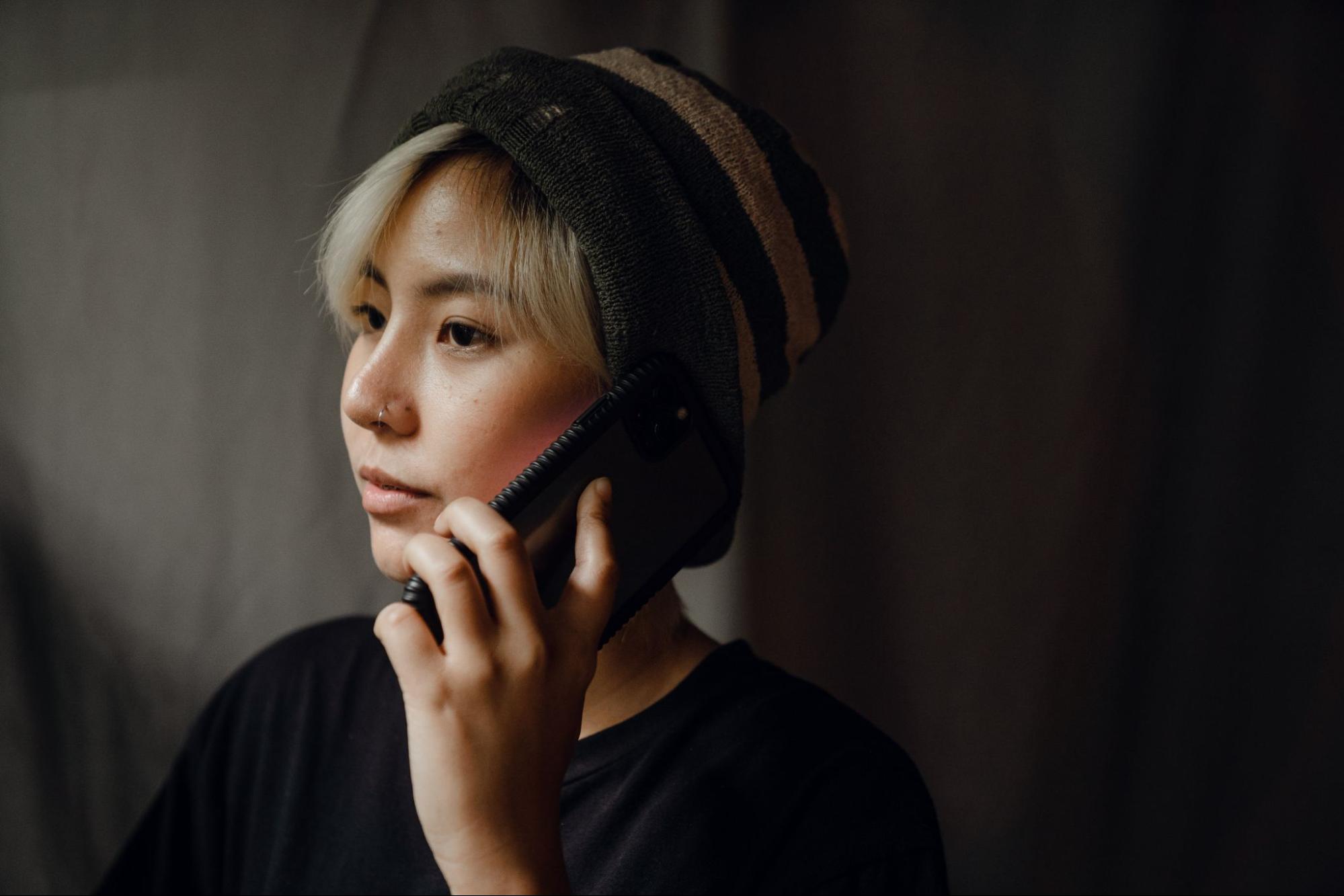
Image credit: Pexels
Once the cause of death has been verified, the NOK will be able to obtain the digital death certificate of the deceased on My Legacy.
You may also call the police if there is no doctor available. Do note that the police will transport the deceased’s body to Mortuary@HSA in this case. The NOK and other family members will be contacted to come down to identify and claim the body for the funeral.
Overseas
Singapore citizens and permanent residents must have their deaths registered with the ICA Registry of Births and Deaths, even if they passed away overseas. The responsibility lies on the NOK who’ll need to obtain a death certificate from the country that the deceased died in. You’ll then have to report the overseas death on ICA.
You may contact the Ministry of Foreign Affairs for help in this matter. Their consular officers can also help to arrange for undertakers for repatriation of the deceased’s body as well.
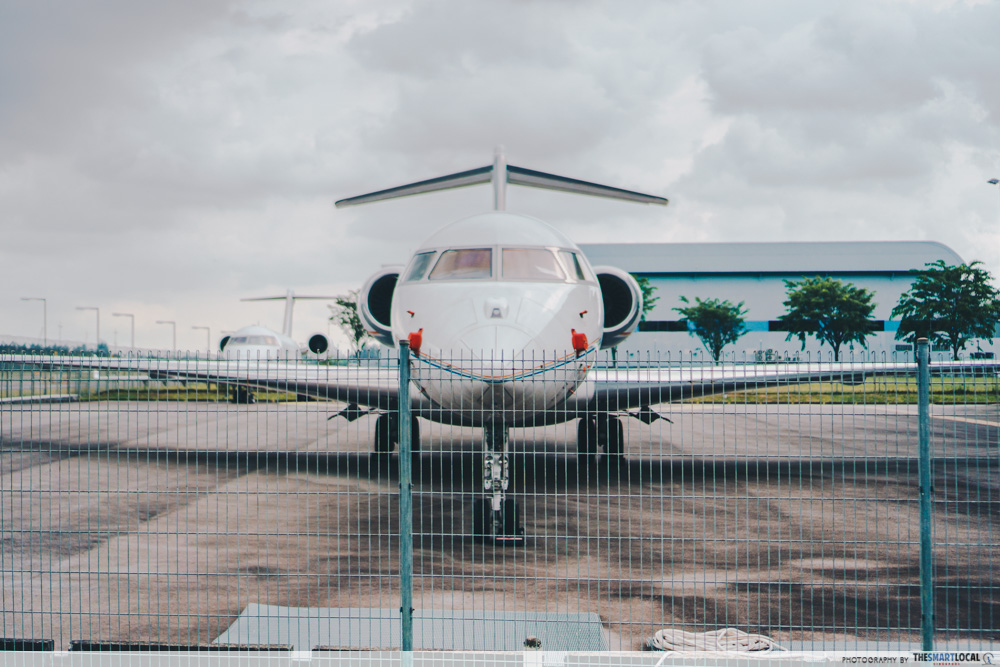
Repatriating the body back to Singapore for burial or cremation is easiest handled by a funeral director here or the undertaker overseas. They’ll be able to help with transport of the casket, as well as the preparation of the following documents required:
- Foreign death certificate
- Embalming certificate
- Sealing certificate
- Coffin export permit from the country where deceased’s body is
- Airway bill
- Letter of authorisation from the National Environment Agency (NEA) to handle the casket
These documents are to be submitted to the funeral director for the application of the coffin import permit. A copy of the above will need to accompany the casket as well on the flight to Singapore.
To facilitate the importation of the casket, you should inform MFA of the date of arrival and flight number of the plane transporting the casket.
Unknown or unnatural cause of death
In the event that the cause of death cannot be determined, the case is then handed over to the police. The police will then transport the body to the Mortuary@HSA, located within Singapore General Hospital.
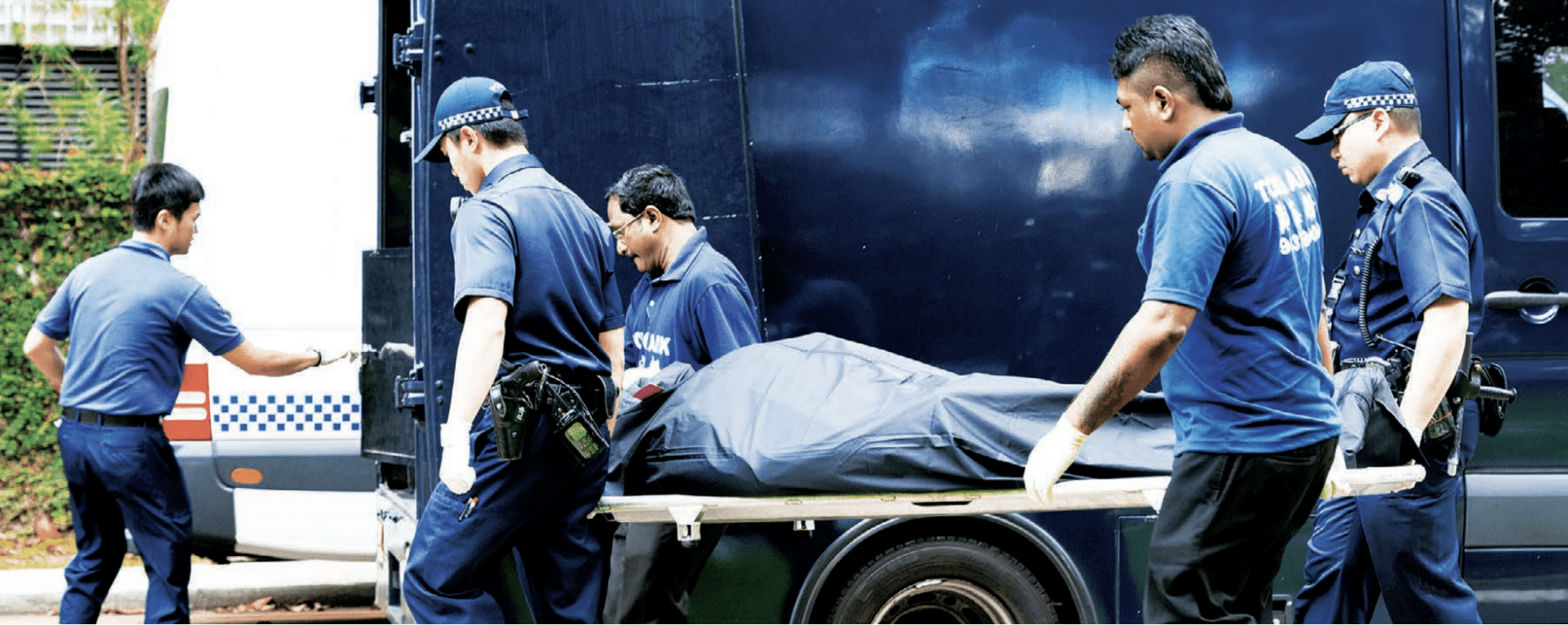
Image adapted from: Singapore Police Force
The NOK will be notified as to when they’ll be able to go down to the mortuary to identify the deceased’s body. This is done with a coroner who might suggest an autopsy, should the cause of death not be identifiable.
If the autopsy confirms that the death is unnatural, such as suspected murder or suicide, there will be a need for further investigations by the police. The family will only be able to collect the deceased’s body and digital death certificate once an investigating officer contacts them.
Preparing for a wake & funeral service
After death registration comes preparations for the wake and/or funeral. You and your family should decide on the type of wake and/or funeral service for the deceased. This could be based on their religious beliefs or what the family would prefer.
Once that’s settled, you can engage a funeral director to help with setting up of the wake and funeral, as well as cremation or burial procedures. My Legacy has a directory of funeral directors categorised by religion.
The most basic services that a funeral director will be able to provide are the arrangement of a cremation or burial of the deceased, should your family decide not to hold a wake or funeral. Packages for this start from $1,000.

Carefully consider what elements of the funeral you’ll want before choosing a bereavement package.
Image for illustrative purposes only.
Most funeral directors will have bereavement packages to include a wake and funeral. It’s up to you how long the wake and funeral should be. On average, these last around 3 days, but depending on the religion, this can range from 1-7 days. Packages usually start from $3,000 and will get more expensive for longer services.
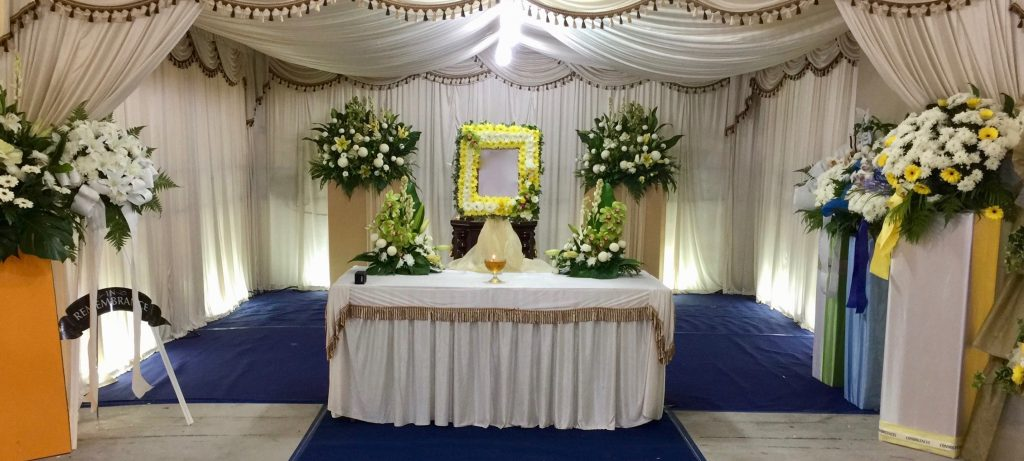
Basic funeral set up for non-religious service.
Image credit: Singapore Funeral Services
Some things you’ll want to consider in a bereavement package are:
- Embalming, dressing, and makeup services for the deceased.
- Set up of tables, chairs, and portable toilets if needed.
- Food and drinks for guests.
- Optional ornamentation of the wake and funeral such as flowers, candles, and religious statues.
- Optional rental of funeral parlour.
Your funeral director should also be able to advise on the permits needed for holding the wake at locations like the void deck of an HDB or within a landed property if you decide not to book a funeral parlour.
Cremation
Cremations are higher in demand these days, as burials have a time limit of 15 years on them. However, some religions, such as Islam, do not allow for cremation, so burial is the only other option.
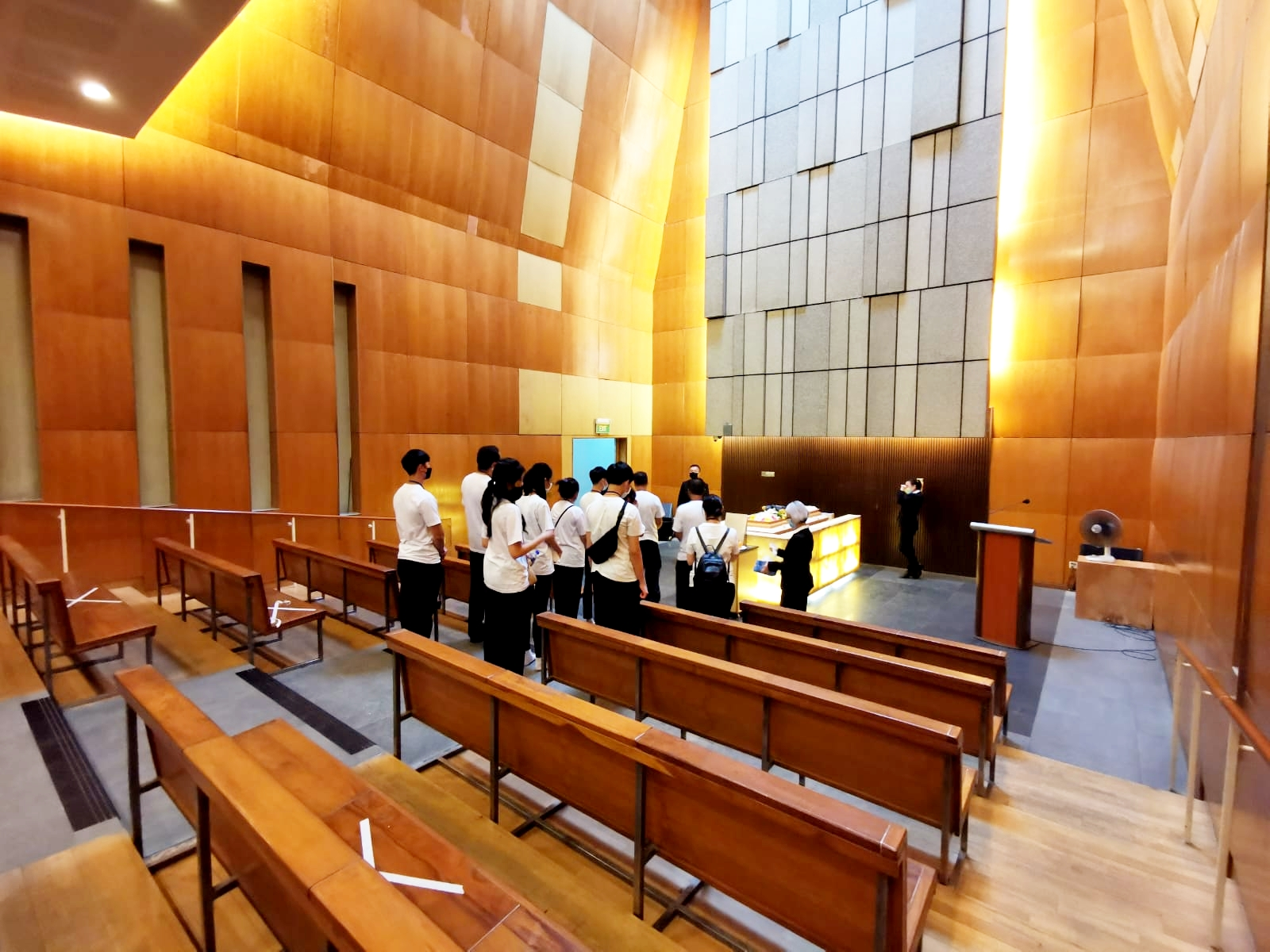
Mandai Crematorium and Columbarium Complex.
Image credit: Nirvana Singapore
If the family has decided on a cremation, the NOK will need to apply for a cremation permit on the NEA ePortal. This is necessary for booking a cremation slot. There is a public one at the Mandai Crematorium and Columbarium Complex, as well as 2 privately-owned crematoriums at Kong Meng San Phor Kark See Monastery and Tse Tho Aum Temple.
The permit is already tied to a cremation slot at Mandai. Should you wish to cremate at the monastery or temple instead, you’ll have to contact them separately to make a booking.
Mandai Crematorium and Columbarium Complex
Address: 300 Mandai Road, Singapore 779393
Opening hours: 8.30am-4.30pm, Daily
Contact: 6554 5655
Kong Meng San Phor Kark See Monastery
Address: 88 Bright Hill Drive, Singapore 574117
Opening hours: 9am-3pm, Daily
Contact: 6849 5333 | Kong Meng San Phor Kark See Monastery website
Tse Tho Aum Temple
Address: 601 Sin Ming Drive, Singapore 575719
Opening hours: 9am-3pm, Daily
Contact: 6454 7666 | Tse Toh Aum Temple Facebook
You’ll also need to decide on what to do with the ash remains of the deceased’s body after it’s been cremated. This can include storing the urn in a niche, or scattering the ashes at sea or inland.
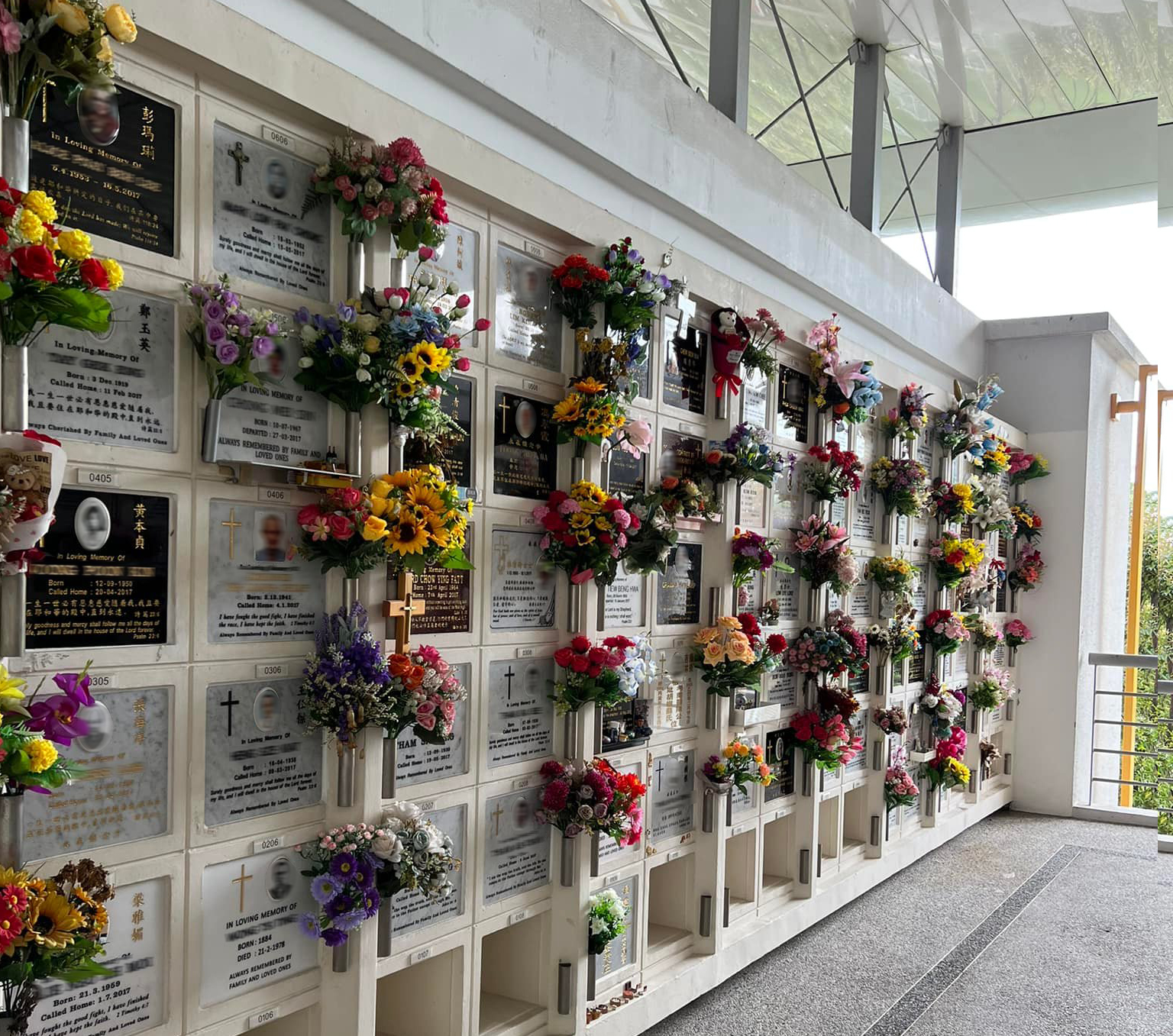
Niches at Mandai Crematorium and Columbarium Complex.
Image adapted from: @bwinhuat
With niches in columbaria, family members and even close friends of the deceased can pay their respects long after the funeral service is over. Some religions, such as Buddhism and Taoism, may encourage niches, so that descendents can practise the ritual of tomb-sweeping for the Qingming Festival.
Ash scattering may not allow for that practice, but the act of it may still help to bring closure to grieving family and friends.
Niches are widely available in Singapore at the public columbaria at Mandai and Choa Chu Kang. A personal one costs $500, while family niches for married couples costs $900. There’s an additional charge of $250 should you wish to pick a specific niche at either columbaria. You may not book a niche in advance at these columbaria.
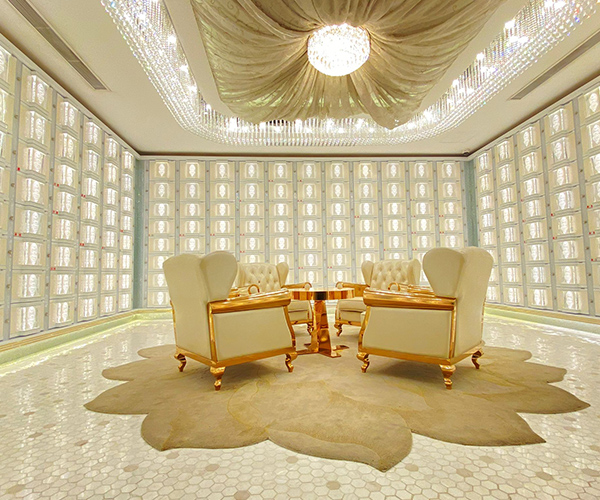
Niches at Nirvana Fu Gui.
Image credit: Nirvana Singapore
There are also plenty of private columbaria that cater specifically to the deceased’s religious beliefs, such as The Garden of Remembrance for Christians, and Jin Yin Memorial and Nirvana Fu Gui for Buddhists and Taoists. You may also refer to this list for Catholic parishes with columbaria.
Prices range from $2,000-$10,000 for a single niche at a private columbarium. You’ll want to factor in additional fees such as booking and maintenance fees to the final cost as well.
If you’d rather scatter ashes, you can speak to your funeral director to make arrangements for a sea burial or at the newly operational Garden of Peace at Choa Chu Kang. Sea burials are done daily near Pulau Semakau, but you must contact the Port Marine Safety Control Centre at 6325 2488 before doing so.
The Garden of Peace is an inland ash scattering area near the Choa Chu Kang Columbarium only for deceased Singapore citizens and permanent residents. The NOK will have to apply for an ash-scattering session on the NEA ePortal and make a payment of $320 online.
Burial
The options for burials are more straightforward, since they’re not as common. There is only one cemetery left in Singapore that is open for burials – the Choa Chu Kang Cemetery Complex. The complex is divided into different cemeteries based on religion, such as Islam, Judaism, Chinese, and Christian. There is also a non-denominational cemetery for the non-religious.
To book a grave, you’ll need to apply for a burial permit on the NEA ePortal then call the cemetery for a burial plot.
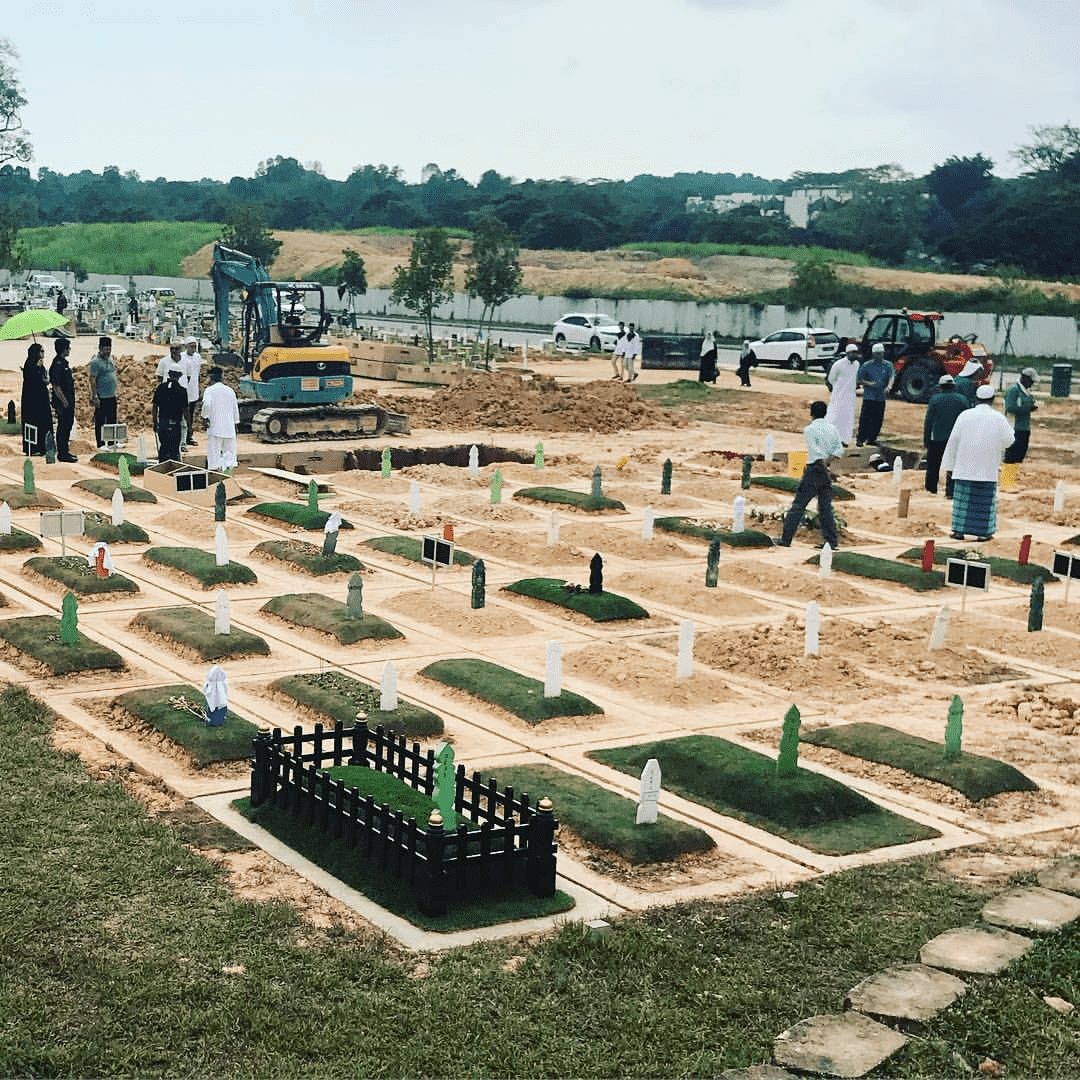
The Muslim cemetery at Choa Chu Kang Cemetery Complex.
Image credit: @dalyfilsuf
Burial fees are subsidised for Singapore citizens and permanent residents. Costs range from $315-$940, depending on the cemetery chosen. Foreigners who wish to be buried here will only be allowed if their immediate family members are Singapore citizens or permanent residents. It will cost $1,880 for their burial plot, regardless of which cemetery they are placed in.
Graves are leased out for 15 years only. After which, the body is exhumed and either cremated, if their religion permits it, or re-buried into smaller plots. The cremated remains can be collected by family members if they wish to. Otherwise, the uncollected remains will be scattered at sea.
Choa Chu Kang Cemetery Complex
Address: 910 Choa Chu Kang Road, Singapore 699819
Opening hours: 8.30am-4.30pm, Daily
Contact: 6793 7428
What to note for various religious backgrounds
Your funeral director will be able to provide greater detail on what is necessary to carry out a religious funeral or wake. Various sects and denominations under the same religion may also have their own practices, but here are the more common customs that are carried out:
Muslim
Muslims don’t hold wake services, only funeral processions, as they believe that the body has to be buried within 24 hours after death.
The procession will take place at home or a mosque if there’s no space. Before that, the deceased’s body must be prepped for burial. This includes stripping the body of any unnatural substances such as nail polish and dentures. The body will also need to be washed by family members of the same gender then shrouded in white cloth.
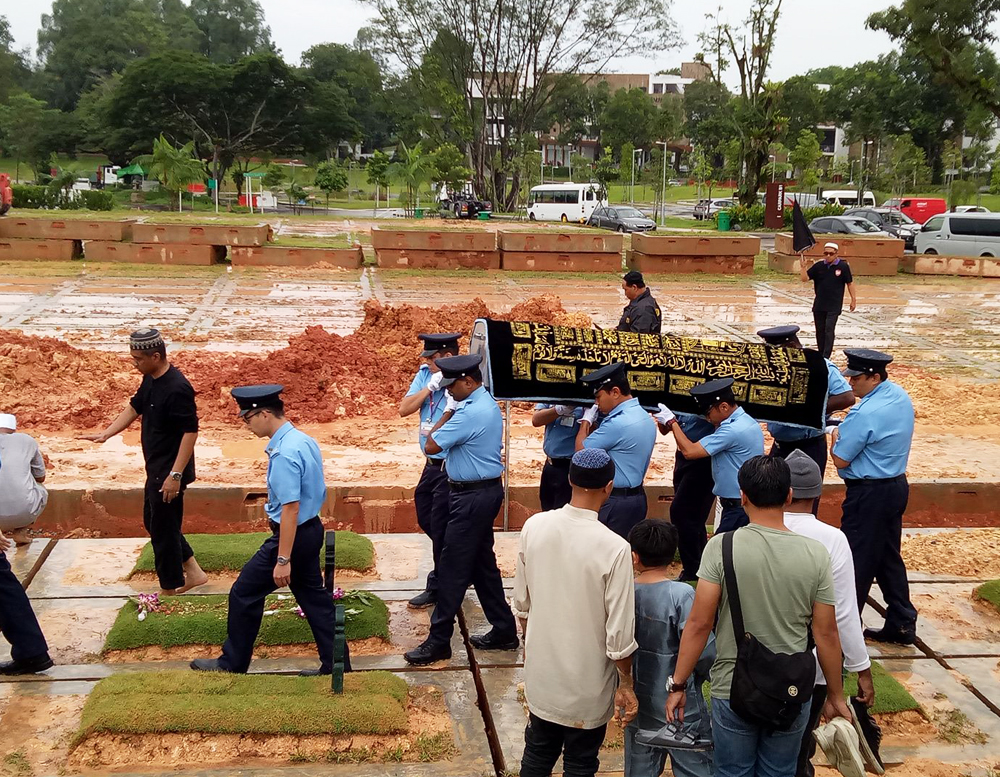
Image credit: Jasa Budi Muslim Casket
Thereafter, certified funeral directors or an Imam will carry out the prayers and religious rites, before the body is transferred to the burial plot. The body is lowered as is into the ground, without a coffin. The head of the body should face Mecca and the face touching the earth. A tombstone is then erected to mark where the head of the body is.
Buddhist
In Buddhist tradition, a funeral should last an odd number of days, usually 3 or 5. There’s a wake during the first 2 or 4 days, where the body is embalmed, made up, and dressed before being placed in a casket. The casket often has a glass window for viewing the deceased’s face, unless they were disfigured at the time of passing.
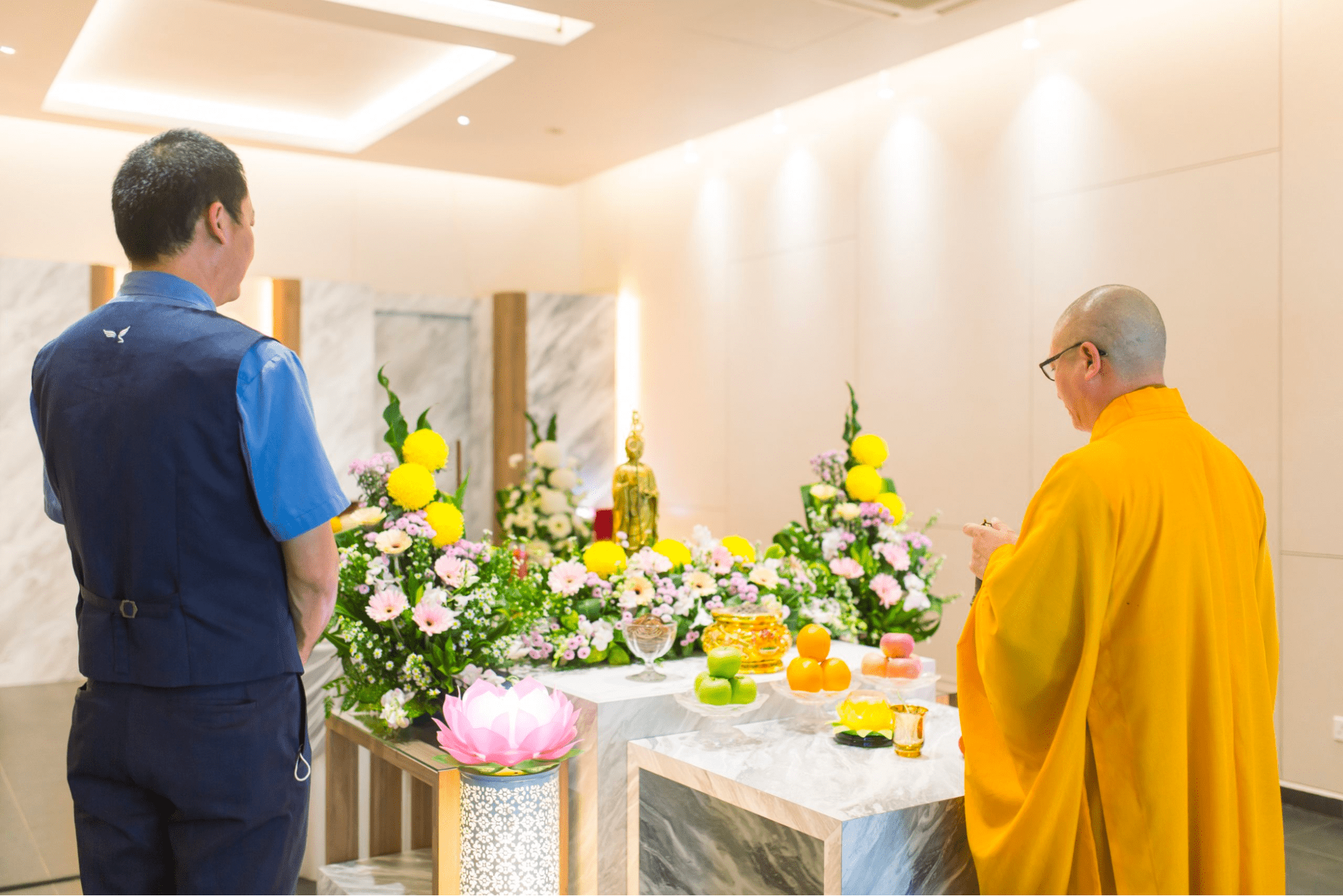
Image credit: Casket Fairprice
An altar is also set up in front of the casket, and it displays fruits, candles, and objects of significance by the deceased. You’ll also find a portrait of the deceased at the altar, as well as statues or motifs of Buddha in the set up. Visitors can pay their respects to the deceased by offering joss sticks and food at the altar, although it is not necessary.
Fabric patches are worn by the family throughout the funeral. The colour and texture of the material denotes their relationship with the deceased, such as navy for paternal grandchildren. Various dialect groups have their own patch system for distinguishing immediate family members.
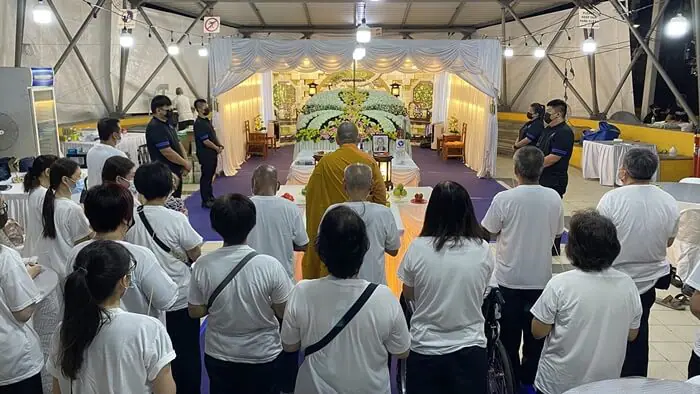
Image credit: Empathy Funeral Service
During the wake, Buddhist monks will come to pray for the deceased. Family members are encouraged to join in, but you do not have to if you practise a different faith. Immediate family members are also to stay by the casket around the clock.
There will be a final procession led by a senior monk on the last day of the funeral. After the casket is loaded into the hearse, the family will trail after it for a short distance then make their way to the cremation or burial site. During the last farewell, the family is invited to place flowers into the open casket before the cremation or burial.
Taoist
Taoist funeral traditions are quite similar to Buddhist ones, such as setting up an altar, wearing patches on the sleeves of their mourning clothes, and offering joss sticks and food to the deceased.
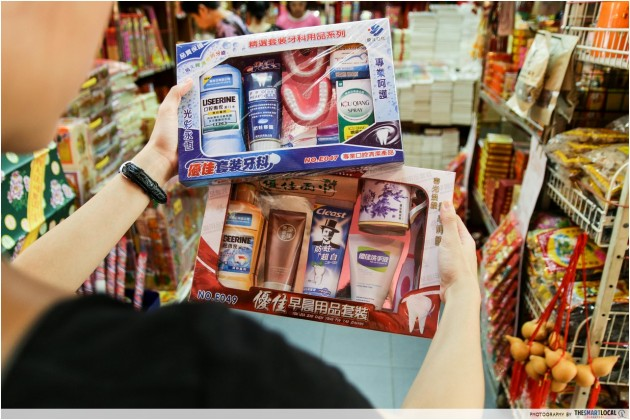
Paper offerings for the dead.
The main difference is the inclusion of paper offerings or kim zua. These are effigies of servants, houses, cars, and even other luxuries like mobile devices and handbags. Burning these is said to provide a comfortable life for the deceased in the afterlife. Hell notes are also folded into ingots to be burned as a form of currency for the deceased.
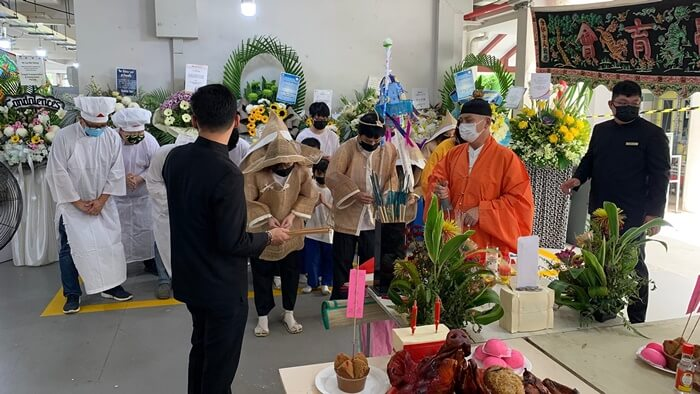
Image credit: Empathy Funeral Service
Instead of monks, the funeral ceremony is led by Taoist priests accompanied by musicians who play the erhu, cymbals, and drums as the prayers are being chanted. On the last night of the service, the head priest will walk around a fire surrounded by 9 tiles. He’ll break the tiles as a symbol of the deceased being emancipated from hell.
Another major contrast between Buddhist and Taoist funerals is the mourning. Taoists are expected to loudly mourn and grieve for the deceased as a way of showing filial piety. It’s also said that the loud cries are pleasing to the Gods and will help the deceased find their way to the afterlife. A pearl is also sometimes placed in the mouth of the deceased for the same reason.
Catholic
Catholics will hold both a vigil and a funeral service for the deceased. The vigil lasts 1-2 days and is usually held in a funeral parlour, at home, or the HDB void deck. This is meant for friends and family to come and pay their respects to the deceased.
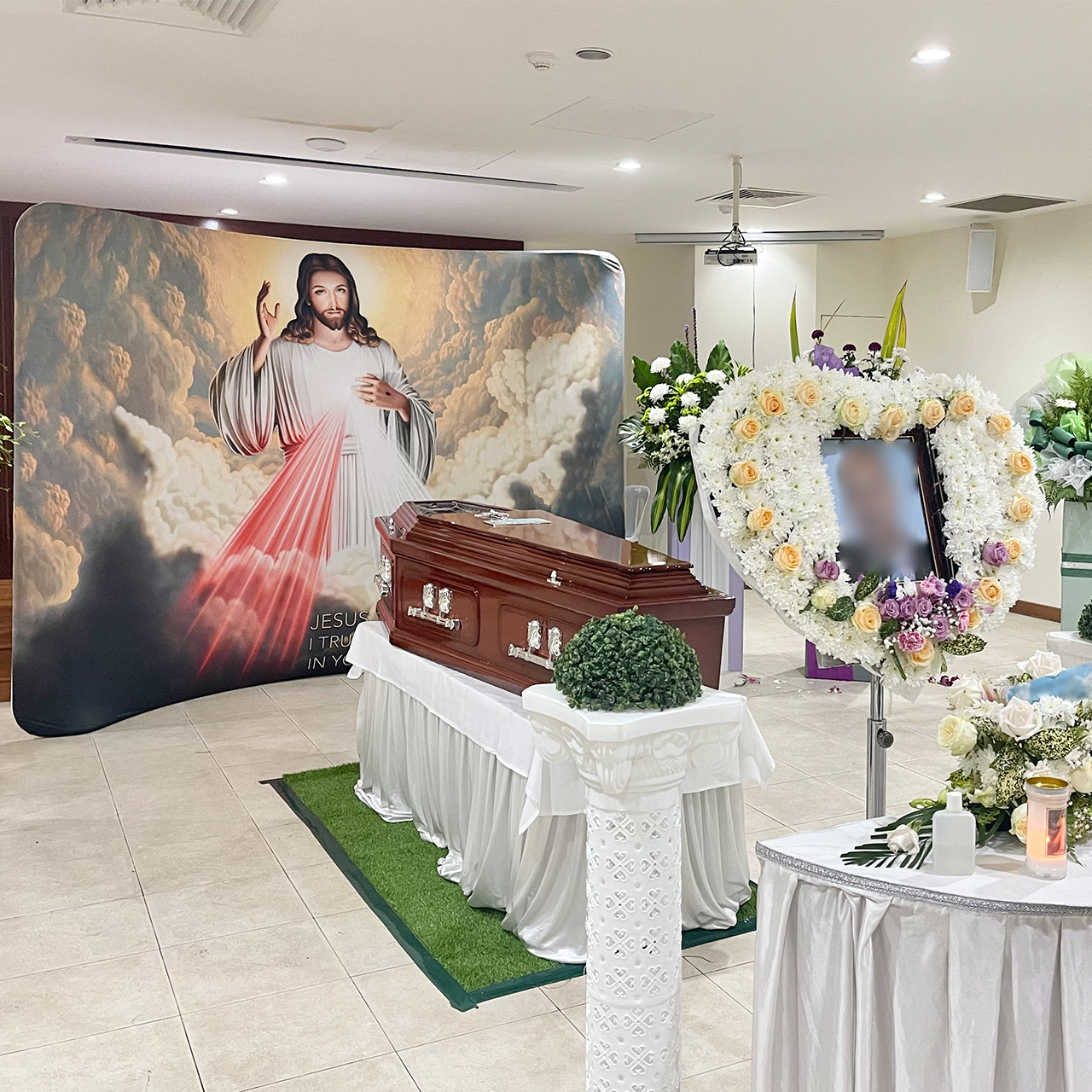
Image credit: Harmony Funeral Care
The wake set up is kept quite simple with just a few floral arrangements and wreaths surrounding the casket. Families may also ask to display a picture of Jesus Christ and a cross with the casket. Most will also choose to burn the paschal candle throughout the vigil.
There might be a vigil service in the evening, where a priest will lead in the recitation of the Rosary and other Bible passages, as well as the singing of hymns.
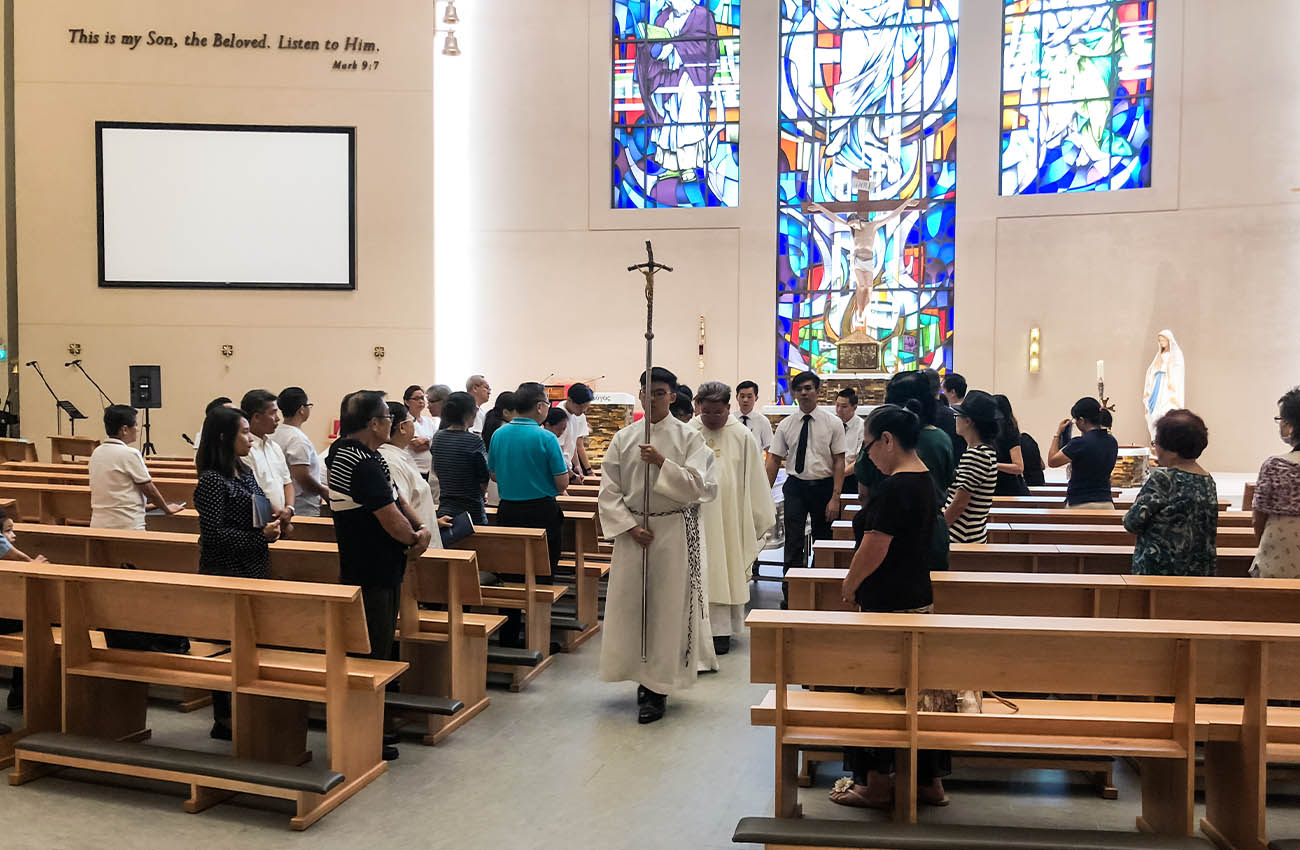
Image credit: Singapore Funeral Group
The 3rd day is reserved for the funeral service, which is usually done at the deceased’s frequented parish. The family or funeral director will have to contact the parish to book a date and time for the funeral service. This should be done before booking the appointment for the cremation.
The priest will lead the congregation in a requiem mass, which includes more prayers and hymns. In some services, holy communion is offered to baptised Catholics to consume. At the end of the service, the casket is carried out by pallbearers into the hearse to deliver it to the crematorium or burial site. The cremation or burial is usually only attended by family members.
Christian
For the uninitiated, Christian funerals might look like Catholic ones, but there are significant differences. For one, most Christian funerals do not include a portrait of Jesus Christ or the paschal candle set up of the wake.
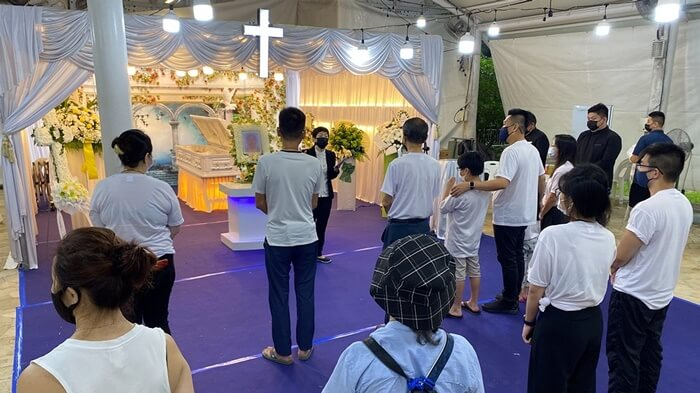
Christian wake.
Image credit: Empathy Funeral Service
The vigil service is also replaced by a wake service that is led by a pastor. Apart from a short message from the Bible and the singing of hymns, family members also share eulogies and memories of the departed.
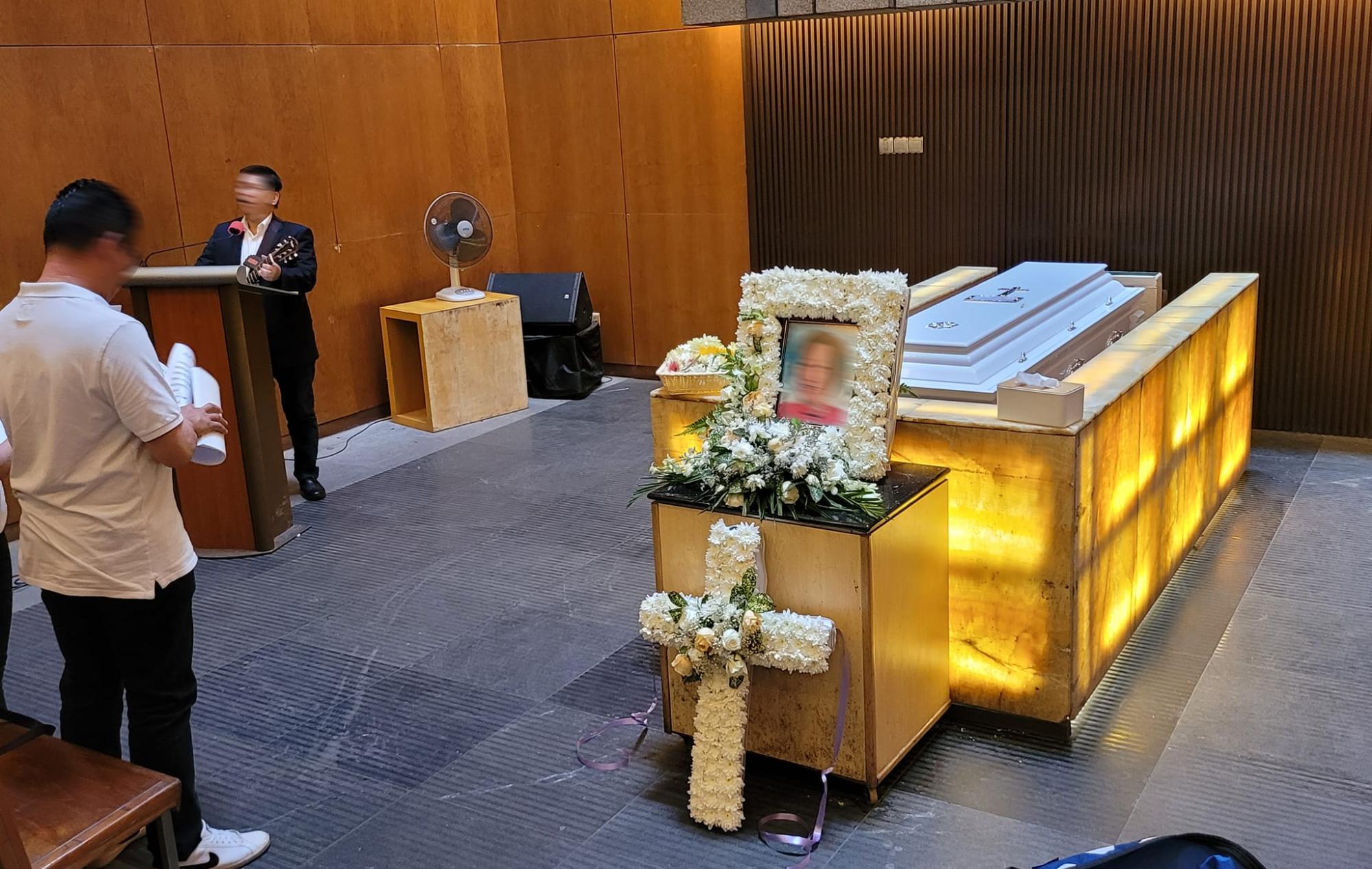
Farewell service at the crematorium.
Image adapted from: Singapore Christian Funeral Services
The last service of the memorial takes place at the crematorium or burial plot itself. Here, the pastor will give one final message and invite the family to say their last goodbyes.
Hindu
Hindu funeral processions are short, keeping to about a day or 2 days from the time of passing. But, the full funeral rites might take up to 30 days.
After death, the body is cleansed, sometimes with milk, honey, yoghurt, and ghee. It is then embalmed and brought back to the deceased’s home, although it isn’t uncommon these days to hold the wake at an HDB void deck or in a funeral parlour. The casket is usually filled with flowers and fragrances, such as turmeric for females and sandalwood for males.
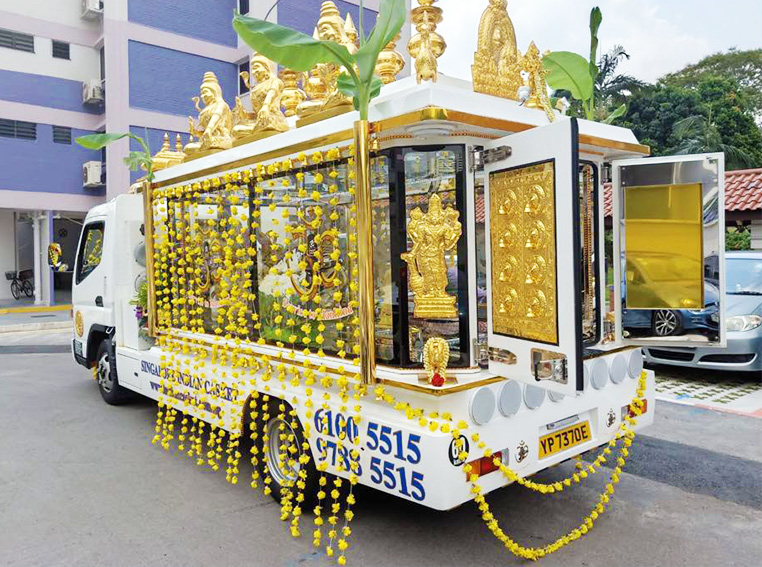
The hearse is often ornamented with gold-leaf statues.
Image credit: Singapore Indian Casket
The wake is usually reserved just for family members. During which time, the bereaved will recite prayers over the casket and place rice balls near the head of the body. 24 hours after the death, the body is taken to the cremation site. There is a Mukhagni ceremony where the family is given one last look at the deceased.
The collected ashes are brought back home for 10 or 30 days. The urn is displayed with a photo of the deceased that is adorned with garlands of flowers. Close friends of the deceased are welcome to come over to pay their respects and give their condolences.
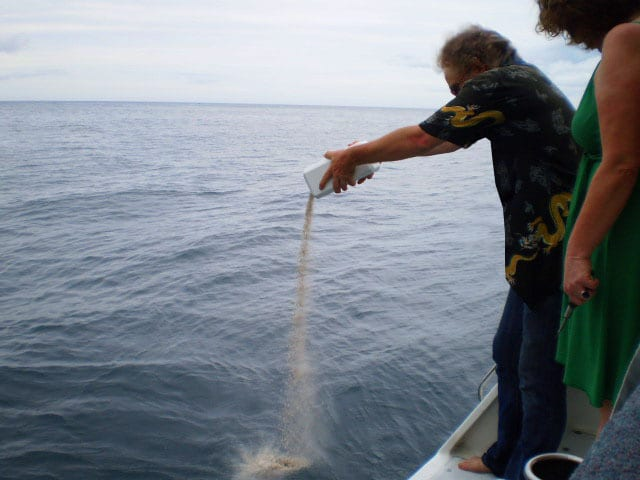
Image credit: Cronulla Party Boats
The ashes are then usually scattered into the sea by the men in the family on the 10th or 30th day after prayers are recited by the family. There may also be additional rituals performed by the family on the 16th day after death.
Informing your friends & family about the death & funeral
With social media and messaging services like Telegram and WhatsApp, getting the word out on the passing of a loved one to tech-savvy generations is quite simple. Older folk, however, may still prefer receiving such news via a phone call.
Getting in touch with friends of your grandparents, however, may be tricky, if you aren’t familiar with them. In this case, publishing an obituary in a newspaper may be the best way of informing them of the passing.
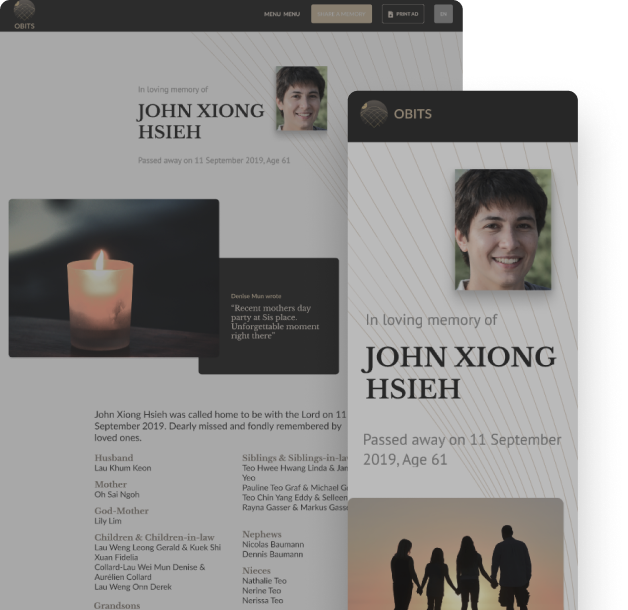
Image credit: Obits
You may contact Obits for a print (from $1,040) and/or digital (from $120) in dailies such as The Straits Times and Lianhe Zaobao. You’ll need to provide a copy of the death certificate as proof.
Regardless of medium, you’ll want to ensure that you mention how the deceased is related to you, so that your friends will be able to send appropriate condolences. Also include details of the wake and funeral services that are open to visitors, if there are any.
You may also wish to inform friends and family about the time of departure for the cortege, as well as the arrival at the crematorium or burial plot, for those who would like to be there.
Funeral FAQs & wake etiquette
Various religions have their own funeral customs but the etiquette for guests remains similar across all funerals. Here’s what you should observe:
What to wear to a funeral or wake?
It is best to come dressed conservatively in muted colours, such as black, navy blue, or white. For Hindu and Buddhist funerals, white is preferred. Immodest clothing that is revealing or shows off your figure is frowned upon. Muslims will require that you cover your arms and legs for the service; women should also cover their heads.
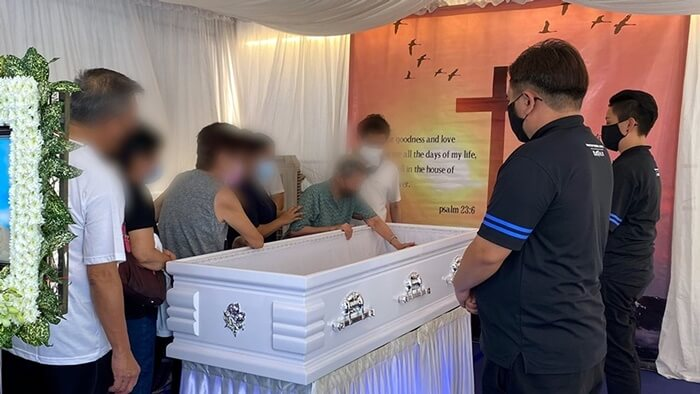
Image credit: Empathy Funeral Service
Be tactful when accessorising – remove if possible or keep them small and modest before going for the wake or funeral service.
Should pregnant women or children attend a funeral?
In Chinese culture, it is often considered taboo to do so, as it might bring bad luck onto the unborn child. Should they want to attend, they are to tie red thread or a sash around the belly. However, this is based on superstition and up to the pregnant individual to follow.
Hindu funerals forbid pregnant women from attending funerals, as there are beliefs that it might cause a miscarriage.
Children are welcomed to attend any wake or funeral, regardless of religion. They should be accompanied by a parent or guardian and follow the general etiquette of remaining respectful and mournful. It’s best to prepare the child on what to expect before they attend the funeral so they aren’t overwhelmed by what is happening.
How much bereavement money should I give?
In Singapore, it’s customary to give bereavement money as a form of condolences to the grieving family. You may hear this referred to as pek kim or bai jin (white gold) at Chinese funerals. This money is usually used to help cover part of the cost of holding the funeral.
How much you give is up to you and is usually determined by your relationship with the deceased. The going minimum rate is $10 for colleagues or friends who’ve lost a family member like a grandparent and $30-$50 if it’s their immediate family member.
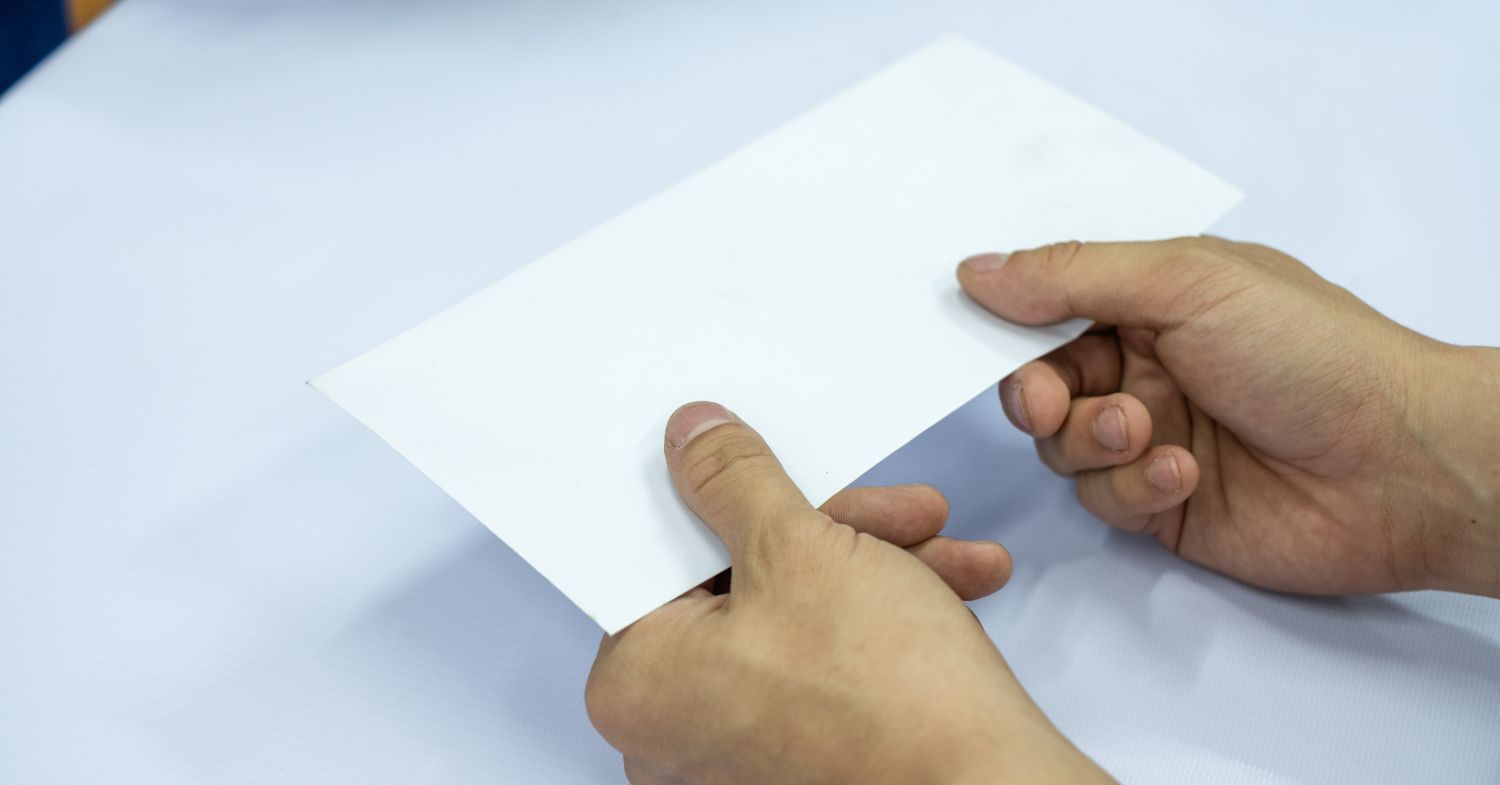
Image credit: Canva
For your own relatives, prepare at least $50 per person in your family attending the funeral. You may also prepare a token sum of $10-$30 per person for family members who may not be able to attend the funeral.
Try to avoid even starting numbers, such as $20, $40 or $80 for the bereavement gift, as it’s considered inauspicious. The money can be sealed in a white envelope or dropped into the bereavement box.
The bereaved family should appoint 1-2 members of the family to keep a record of who and how much has been given, so that you know how much there should be at the end of the funeral.
Should I send flowers or gifts to the family?
You’ll often find flowers at wake services that have been sent as condolences for the family. What you might not know is that some religions do not accept such a gesture, no matter the intention behind it.
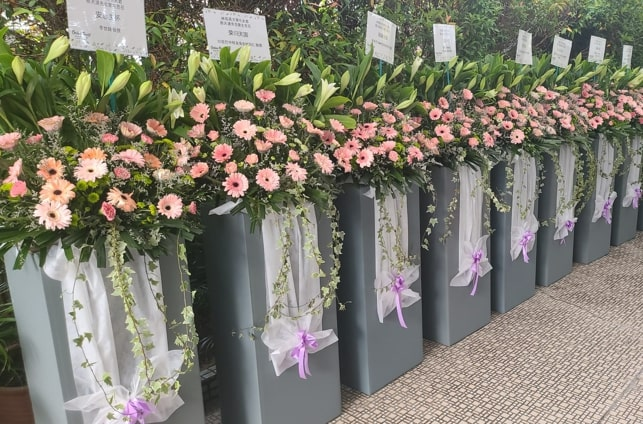
Image credit: Best Florist Reviews
Muslim families might accept small floral arrangements that use fragrant flowers, but it’s best to check with the family first as not all Muslims follow this practice. Flowers are considered an inappropriate gift for Hindu funerals and you should avoid sending any. If you must send something, consider bringing a fruit basket with you on your visit during the mourning period.
For all other religions, wreaths are often a popular choice to send during the wake. Note that the flowers should be mournful ones, such as carnations and chrysanthemums in white.
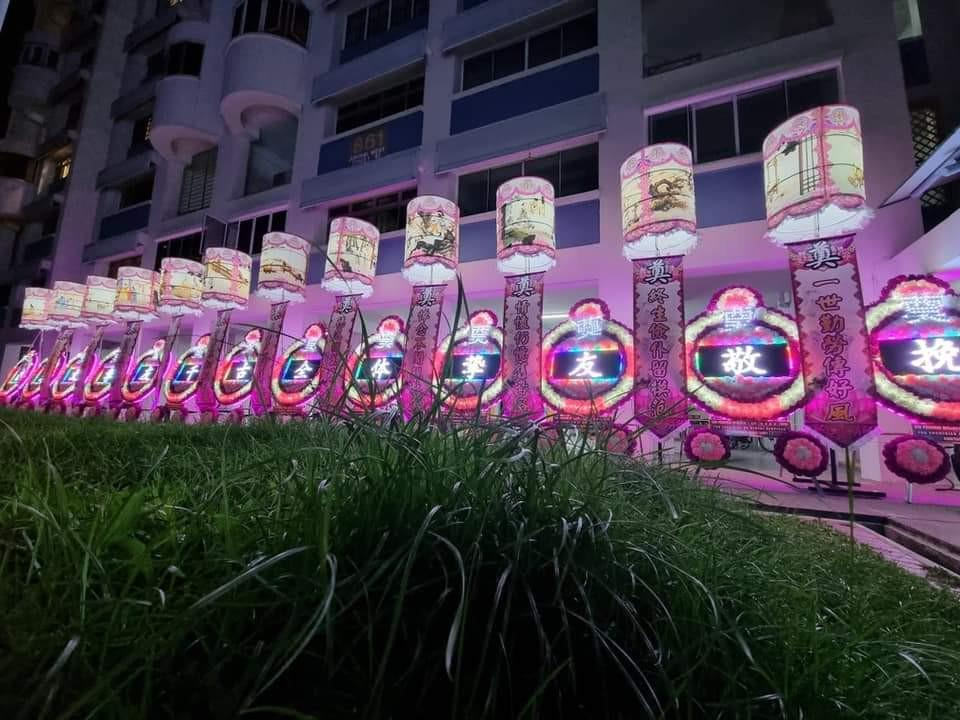
Image credit: LED Wreaths
LED wreaths are a popular choice over traditional flower wreaths. You’ll have to call ahead to the family to ask if they’re able to accept an LED wreath, as there is a maximum of 10 that can be displayed at one time. This is to reduce noise and light pollution, as well as keep public spaces free from obstructions.
If they do, you can call the LED wreath company to personalise your message and inform them of the duration of the wake. The wreaths are collected after the funeral to be recycled for other funerals.
Another gift you may send to the bereaved are condolences blankets. These are often sent at a Taoist or Buddhist funeral. The blanket is usually decorated with couplets that wish the deceased well in the afterlife. You’ll often find these gifts hung up around the funeral or void deck. The family may take these home as a keepsake after the funeral is over.
What to do after a funeral
While the funeral process may be your final send off to your loved one, there are still a number of things to settle after that, such as the deceased’s properties and accounts. For Muslims, this must be done based on Muslim inheritance law. Families can refer to MUIS for instructions on what to do.
If the deceased is not Muslim, you may follow this guide on what to do:
If there’s a will
Ideally, the deceased would have left a will in an accessible place to simplify matters, otherwise check with their lawyer or other family members if there’s one. The will should state an executor, who is appointed to distribute the deceased’s estate to the beneficiaries in the will. The role is often given to an immediate family member.

The executor will need to apply for a Grant of Probate on My Legacy. They’ll also need to prepare a Schedule of Assets (SOA), which is essentially a list of things belonging to the deceased and their monetary value. This will include property, bank accounts, insurance policies, shares, and other possessions.
It’s the duty of the executor to pay off any outstanding liabilities, such as taxes, loans, and other debts using funds from the SOA. Only then will the executor be allowed to distribute assets to the beneficiaries according to the will. The executor should be aware that not following the will is considered an illegal offence.
In the off chance that there is no executor or the executor is unable or unwilling to fulfil their duties, the listed beneficiaries will need to apply for Letters of Administration (LOA). This allows them to become administrators of the deceased’s estate. They’ll then have to prepare the SOA, pay off the debts, and distribute the assets.
If there isn’t a will
When the deceased hasn’t left a will, the immediate family members will become administrators of the will. Priority is given to the spouse first, then children, followed by parents. Similarly, they’ll need to apply for LOA as above.
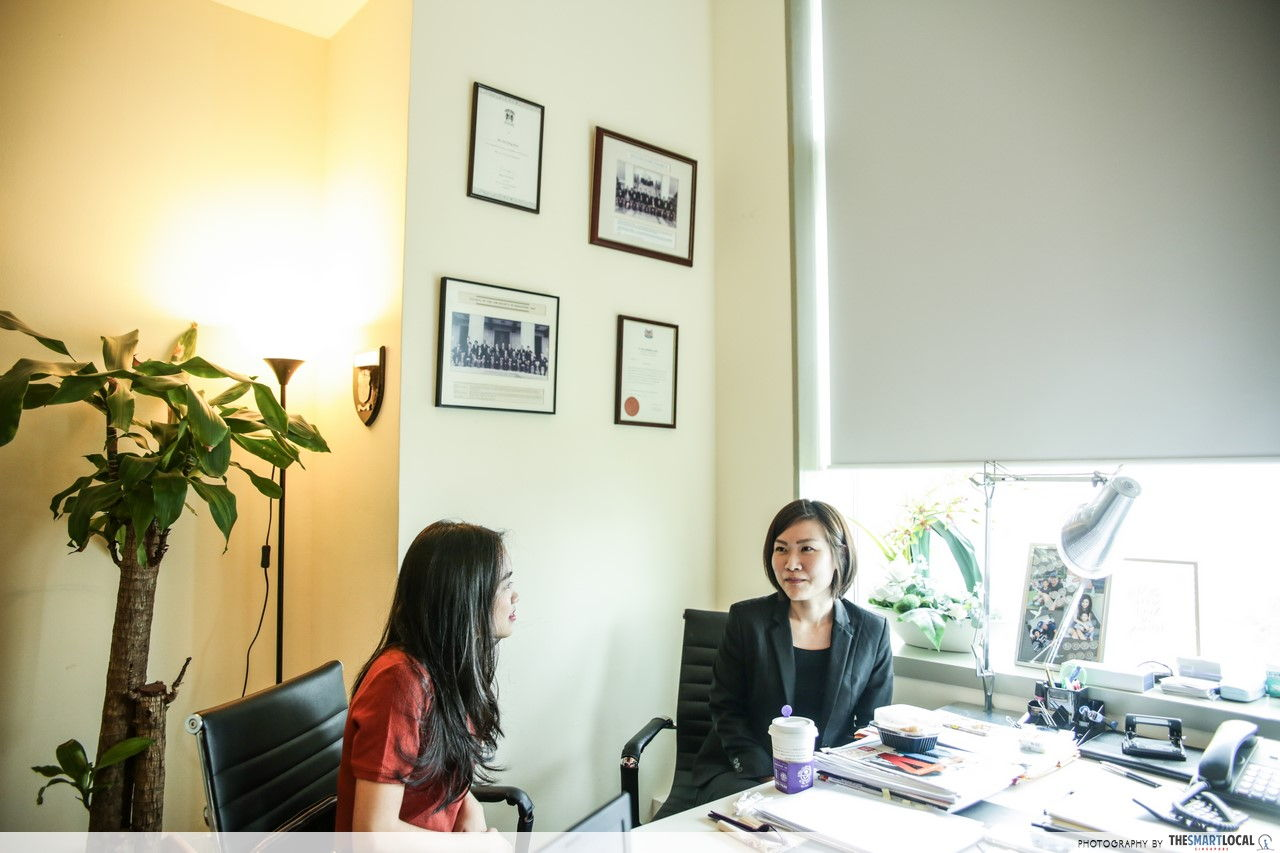
If there is no will, you may engage the help of a public trustee.
Image for illustrative purposes only.
If the value of the deceased’s estate does not exceed $50,000, the family can apply to the Public Trustee’s Office to get a public trustee to be the administrator. They will then distribute assets according to the Intestate Succession Act, which decides on eligible beneficiaries and percentage they will receive.
Settling of estate and assets
My Legacy has a checklist on assets, liabilities, and accounts to settle for the deceased. You may also refer to this list:
- CPF withdrawal
- Property inheritance
- Vehicle ownership
- Insurance claims and benefits
- Outstanding bills and taxes
- Other accounts and subscriptions
- Bank, credit card, and investment accounts.
- Bills for utilities and subscriptions.
- Memberships to associations and clubs.
- Social media accounts.
Moving on after death
Whether the passing was sudden or expected, dealing with death can be a painful experience. You may want to speak with a grief counsellor to help you process your emotions. Talking with someone will help bring you through the stages of grief, and might grant you closure in losing a loved one.
There are mental health hotlines you can call if you need a listening ear right now. My Legacy also has a list of counselling services that specialise in dealing with grief.
Planning a funeral in Singapore
Whether you plan to hold a simple or elaborate service for the passing of your loved one, keeping this guide bookmarked will cover all bases when you’re planning or attending a funeral.
For more guides:
Cover image adapted from: Singapore Funeral Services, @dalyfilsuf





